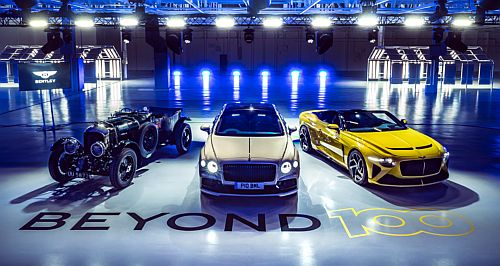Make / Model Search
News - BentleyBentley the latest to scrap EV plansBritish luxury marque revives ICE development, scales back plans to ‘go electric’26 Sep 2025 By MATT BROGAN BENTLEY is the latest vehicle producer to back-pedal on its plans to ‘go electric’.
According to a report published by UK outlet Autocar, the British luxury marque is readying pure-petrol successors to its Bentayga, Continental GT, and Flying Spur lines.
The decision reverses that set out by the company’s Beyond 100 Strategy announced in 2022 when it claimed it would move to all electric vehicle production by the end of the current decade – and follows a decision made by Porsche – another a Volkswagen Group brand – that will see it commit €3.1 billion ($A5.5b) to extended the life of its own ICE-powered models.
Fellow Volkswagen Group company Audi cancelled its plans to go electric-only by 2030 last year.
Bentley CEO Frank-Steffen Walliser told Autocar that because the three brands (Audi, Bentley, and Porsche) share platforms, drivetrains and other key components, decisions and investments in Stuttgart and Ingolstadt have had direct consequences in Crewe.
Mr Walliser confirmed that Bentley still plans to launch a new plug-in hybrid or electric model every year from 2026 but will now balance its drivetrain mix with petrol power.
It is understood much of the decision reflects demand from key Bentley markets including the Middle East and North America.
“There is a dip in demand for luxury electric vehicles, and customer demand is not yet strong enough to support an all-electric strategy,” said Mr Walliser.
“The luxury market is a lot different today than when we announced Beyond100. Electrification is still our goal, but we need to take our customers with us.”
Bentley and Porsche are the latest in a slew of automotive manufacturers who have backed away from their all-electric promises.
Stellantis last week announced it was pulling back from its Dare Forward electric pledge, joining others from Asia, Europe, and the United States.
Early this year, Alfa Romeo (a Stellantis brand) cancelled its plans to go all-electricby 2027, citing the need for ICE drivelines in export markets including the United States.
Another Stellantis brand, Fiat, also said it would shift away from fully electrifying its compact 500 range, admitted a “more pragmatic response” was required to arrest slowing sales.
Aston Martin likewise delayed its EV program, adding a further five years to its self-imposed scheduled.
Audi, BMW, and Mercedes-Benz all announced a recalibration of their future plans, admitting EV sales had not accelerated as briskly as anticipated.
Mercedes-Benz also announced it would pull back on the number of EQ (electric models) it produced after slower than expected sales across its EQE and EQS lines.
Mercedes-Benz also recommitted to both V8 and V12 petrol engine production, signalling a less-than-favourable response to turbocharged four-cylinder and electrically assisted alternatives.
In May, Honda announced it would slash its BEV budget by approximately $32A billion in response to slower than expected uptake of electric cars.
Troubled British prestige car group Jaguar Land Rover also admitted it jumped the gun on going all-electric, saying it would postpone moves to go all-electric until demand picked up, while Lotus last week announced it would cut 550 jobs citing a retraction in the demand for electric vehicles and a “rapidly evolving automotive environment” for its decision.
Lotus is not the only sportscar manufacturer to struggle with greening its image. Earlier this month, Porsche said it has scrapped plans to go ahead with a new EV battery plant, again citing slowing EV demand and “changing conditions in China and the United States” as the root cause.
It is the fourth time Porsche has announced a roll-back of its EV program, admitting in July 2025, February 2025, and July 2024 that it went too hard, too soon on the switch to all-electric.
Mini is likewise considering a rollback of its BEV ambitions, noting in February 2025 that “uncertainties” around the uptake of electric vehicles had forced a rethink of its plans.
Smart also poured water on its EV ambitions in January, saying it would add a petrol-powered range extended to its #5 range to help meet sales targets, while Geely-owned Volvo also announced it would delay its move to produce only electric vehicles saying consumer sentiment had forced a change in tack.
US tariffs and policy changes have also seen General Motors and Ram Trucks (a Stellantis company) turn back the clock on V8 engine development with both announcing hefty investments in future ICE production. Ram further announced delays to both its Ramcharger and1500 range extender vehicles (REVs).
Yet another Stellantis company, Dodge, withdrew its entry-grade Charger R/T electric car citing poor demand.
Ford also signalled it will focus more heavily on range extender vehicles as sales of its F-150 Lightning failed to hit the mark.
Cupra, Canoo, Fisker, Ineos, and others have postponed or been forced from the market entirely, while others consolidate to survive.
It’s a situation that all but hands the lead to Chinese EV makers as the global car market struggles to adapt to a climate of change.
 Read more11th of September 2025  Stellantis pulls back on Dare Forward pledgeStellantis will no longer pursue a target of producing only EVs by 2030, says COO9th of June 2025  GM, Stellantis recommit to V8 enginesHemi rethink at Ram; GM recommits to its V8 program precipitated by market forces15th of April 2025  Stellantis sales fall as demand wanesStellantis struggles continue as European and US demand drives Q1 sales down 9pc31st of July 2024  Stellantis begins voluntary redundancy program……says involuntary cuts may be needed if objectives not met through voluntary means31st of July 2024  Stellantis' Leapmotor begins exports to EuropeFirst batch of electric Leapmotor C10 SUV and T03 hatch leave Shanghai for EU ports |
Click to shareBentley articlesMotor industry news |











Facebook Twitter Instagram